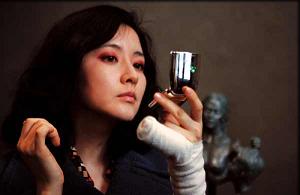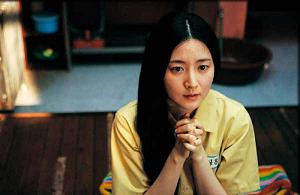

Park Chan-wook's trilogy of films on vengeance finishes with Lady Vengeance. The last film is not as violent as Oldboy and Sympathy for Mr. Vengeance, but is much more satisfying. With Lady Vengeance (the original Korean title was Sympathy for Lady Vengeance), Park takes a step forward by choosing to focus more on the psychological effects of violence. Again, Park deals with moral ambiguities, but this time he extends it to more than one person. The title character, Lee Geum-ja (Lee Yeong-Ah, One Fine Spring Day, The Gift), a notorious criminal completed her sentence. Seventeen years ago, she suffocated a young boy to death. She showed little remorse for the crime, but in the meantime became a devout Christian. Part of her notoriety sprang from her beauty.
The first half of Lady Vengeance is purposefully vague. Park, who co-wrote the screenplay with Jeong Seo-gyeong, dole out information purposefully slow. The plotting is extremely deliberate, and Park jumps back and forth in time. It soon becomes clear that Lee's atonement was a ruse. Once free of jail, she becomes stoic and emotionless. Lee wants to kill somebody, and much of her time in prison was spent concocting an elaborate plan. Most of her accomplices were her cellmates. Park introduces each one, shows how they met, and catches up with them on the outside. Each person has a small part to play, and each willingly does so to help Lee.
Lee's plan comes to fruition in the second half of Lady Vengeance. While the first part was almost numbingly slow at times, Park unleashes Lee (the character) upon her target here, and Lee (the actor) is frightening. She shows little remorse, and goes about everything so matter-of-factly. Lee adds a touch of blood-red eye shadow, because everybody looks so innocent. Initially, this simply looks like a matter of revenge. Lee is pissed at somebody, and is doing everything she can to kill him/her. As Park unfolds the twisting threads of the story, it becomes clear that things are much more complicated.
This complexity is what makes Lady Vengeance so engaging (well, that, and Park's wicked sense of humor). Park forces Lee into a moral dilemma, then pulls in a number of others. He makes them ask questions about what is right and what is wrong, and forces them to choose in horrible ways. What does it mean to forgive and be forgiven? Can one atone for sins that he/she didn't commit? And what is the proper way to punish somebody for horrific crimes? Things are so uncomfortable because Park shows the characters trying to decide these things on the spot, and what a tenuous spot it is. Again, he is putting ordinary people in unusual circumstances, and has them acting like normal people, not like movie characters. The result is riveting.